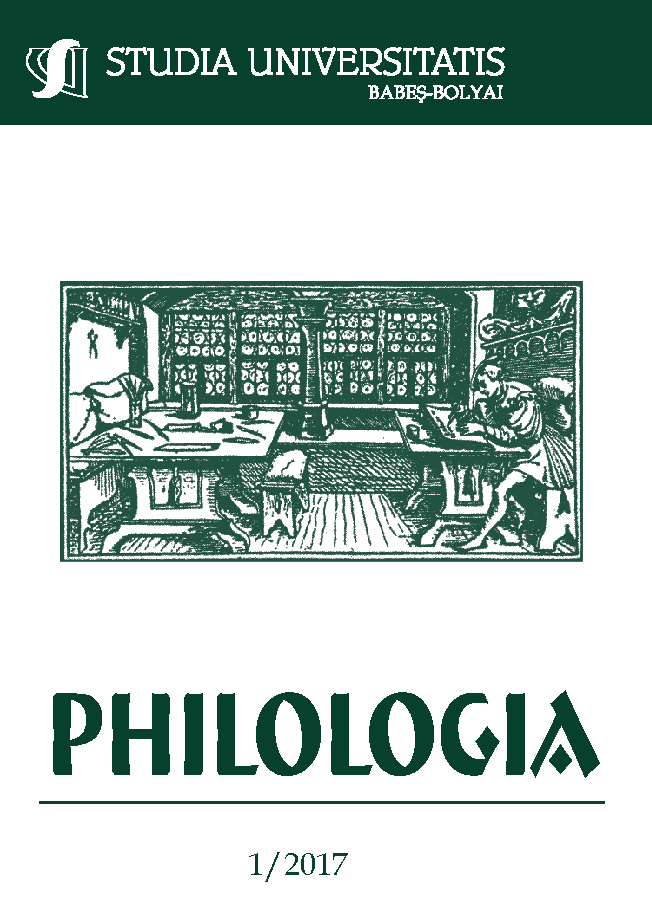“WHEN WILL I BE BLOWN UP?” – WILLIAM FAULKNER’S WRITING WARFARE
DOI:
https://doi.org/10.24193/subbphilo.2017.1.10Keywords:
mock-heroic, anti-hero, parody, irony, visionary poetic imagination, history as fact and/or fiction, warfare trauma and/or memory.Abstract
“When Will I Be Blown Up?” – William Faulkner’s Writing Warfare. The American Civil War (1861-1865) is not William Faulkner’s only warfare. The American modern writer remained faithful to his romantic creed that the poet’s mission is to render the innermost human (self)contradictions. Faulkner’s own writing style evinces this endless state of warfare at the back of his mind. It is like him to make us readers doubt our own peace delusions; yet it is like him also to doubt the solemn rhetoric of any “serious” historical warfare. The purpose of my essay is to prove that William Faulkner’s fiction evoking historical warfare can still help us readers out of our mortal fear. By means of his writing art, championing a sound sense of humor as the only hope for spiritual survival, Faulkner’s message is universal and still valid.
REZUMAT. “Când voi fi aruncat în aer?” – Războiul scrierilor lui William Faulkner. Războiul Civil american (1861-1865) nu este nicidecum singurul război al lui William Faulkner. Scriitorul modern american a rămas credincios convingerii că misiunea poetului este de a reda cele mai adânci contradicții din sufletul omenesc. Însuși stilul literar al lui Faulkner stă mărturie acestei continue stări de asediu din profunzimea minții scriitorului. Este caracteristic pentru el să-și pună cititorii pe gânduri în legătură cu amăgitoarea lor stare de pace; și totuși, la fel de caracteristic pentru el este să pună sub semnul întrebării retorica solemnă a oricărui război istoric „serios.” Scopul eseului meu este de a demonstra că proza literară a lui William Faulkner, evocând diverse momente din războaiele istorice, ne poate încă ajuta pe noi, cititorii lui de azi, să ne învingem teama de moarte. Prin arta sa narativă, arborând un înviorător simț al umorului ca singura speranță de supraviețuire spirituală, mesajul lui Faulkner rămâne universal și valabil.
Cuvinte-cheie: pseudo-eroism, anti-erou, parodie, ironie, imaginație poetică vizionară, istoria ca fapt și/sau ficțiune, trauma și/sau memoria războiului.
References
A New Literary History of America. Edited by Marcus, Greil and Werner Sollors. The Belknap Press of Harvard University Press, 2009.
Alexandrescu, Sorin. William Faulkner. Editura pentru Literatură Universală, 1969.
Bloom, Harold, Ed. William Faulkner, Modern Critical Views Series. Chelsea House Publishers, 1986.
---. The Western Canon: The Books and School of the Ages. Riverhead Books, [1994] 1995.
Blotner, Joseph. Faulkner: A Biography, One-Volume Edition. Vintage Books, [1984] 1991.
Brooks, Cleanth. William Faulkner: The Yoknapatawpha County. Yale University Press, [1963] 1966.
Crane, Stephen. The Red Badge of Courage and Four Stories. Introd. Jeffrey Meyers. Penguin Books, [1895] 2011.
Dickinson, Emily. The Poems of Emily Dickinson. Edited by R. W. Franklin, The Belknap Press of Harvard University Press, 2005.
Faulkner, William. Absalom, Absalom!. The Modern Library, [1936] 1993.
---. As I Lay Dying. The Modern Library, [1930] 2000.
---. Intruder in the Dust. Random House, [1948] 1996.
---. Flags in the Dust. Random House, [1973] 1974.
---. Requiem for a Nun. Random House, 1975.
---. The Portable Faulkner. Ed. Malcolm Cowley. The Viking Press, 1972.
---. The Sound and the Fury. W. W.Norton and Company, [1929] 1994.
---. Uncollected Stories of William Faulkner. Edited by Joseph Blotner. Random House, 1979.
Fiedler, Leslie A. Love and Death in the American Novel. Delta Book,1966.
Gray, Richard and Owen Robinson, eds. A Companion to the Literature and Culture of the American South. Blackwell, 2007.
Gray, Richard. A History of American Literature. Blackwell, 2004.
---. Southern Aberrations: Writers of the American South and the Problems of Regionalism. Louisiana State University Press, 2000.
---. The Life of William Faulkner: A Critical Biography. Blackwell, 1994.
Gresset, Michel and Noel Polk, eds. Intertextuality in Faulkner. University Press of Mississippi, 1985.
Karl, Frederick R. William Faulkner: American Writer. A Biography. Faber & Faber, 1989.
Kartiganer, Donald M. and Ann J. Abadie. Faulkner and the Natural World, Faulkner and Yoknapatawpha, 1996. University Press of Mississippi, 1999.
Mihăieş, Mircea. Ce rămâne: William Faulkner şi misterele ţinutului Yoknapatawpha. Polirom, 2012.
---. Cartea eşecurilor. Eseu despre rescriere. Univers, 1990.
Mitchell, Margaret. Gone with the Wind. Macmillan, [1936] 2015.
Moreland, Richard, ed. A Companion to William Faulkner. Blackwell, 2007.
Morrison, Toni. Playing in the Dark: Whiteness and the Literary Imagination. Random House, [1992] 1993.
Oates, Stephen. William Faulkner: The Man and the Artist. A Biography. Harper & Row, 1987.
Parini, Jay. One Matchless Time: A Life of William Faulkner. HarperCollins, 2004.
Peiu, Anca. Trecutul timpului perfect: de la Thomas Mann la William Faulkner. Editura Universităţii din Bucureşti, 2002.
Porter, Carolyn. William Faulkner. Oxford University Press, 2007.
Rubin, Louis D., Jr. A Gallery of Southerners. Louisiana State University Press, 1982.
Taylor, Walter. Faulkner’s Search for a South. University of Illinois Press, 1983.
The American South: Portrait of a Culture. Edited by Louis D. Rubin. United States Information Agency, [1979] 1991.
Wagner-Martin, Linda, ed., William Faulkner: Six Decades of Criticism. Michigan State University Press, 2002.
Weinstein, Philip M. The Cambridge Companion to William Faulkner. Cambridge University Press, 1995.
Downloads
Published
How to Cite
Issue
Section
License
Copyright (c) 2017 Studia Universitatis Babeș-Bolyai Philologia

This work is licensed under a Creative Commons Attribution-NonCommercial-NoDerivatives 4.0 International License.





 ©Studia Universitatis Babeş-Bolyai Philologia. Published by Babeș-Bolyai University.
©Studia Universitatis Babeş-Bolyai Philologia. Published by Babeș-Bolyai University.